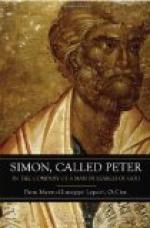“When do you go?” she queried.
“Fourteenth,” he answered.
She considered. “I couldn’t get off by then,” she said, “but I might the twenty-first or thereabouts. I’m due, as you say, and I think it could be managed.”
“Would you?” he demanded, and hung on her words.
She turned her face up to him, and even in the dark he could see her glowing eyes. “It would be heaven, Peter,” she whispered.
He kissed her passionately.
“I could meet you in town easily,” he said.
“Not the leave-boat train,” she replied; “it’s not safe. Anyone might be there. But I’ll run down for a day or two to some friends in Sussex, and then come up to visit more in town. I know very few people, of course, and all my relations are in South Africa. No one would know to whom I went, and if I didn’t go to them, Peter, why nobody would know either.”
“Splendid!” he answered, the blood pounding in his temples. “I’ll make all the arrangements. Shall I take a flat, or shall we go to an hotel? An hotel’s more fun, perhaps, and we can have a suite.”
She leaned over against him and caught his hand to her breast, with a little intake of breath.
“I’ll leave it all to you, my darling,” she whispered.
The taxi swung into the clearing before the hospital. “Peter,” said Julie, “Tommy’s so sharp; I believe she’ll suspect something.”
“I don’t care a damn for anyone!” said Peter fiercely; “let her. I only want you.”
CHAPTER VI
Peter secured his leave for Monday the 21st from Boulogne, which necessitated his leaving Le Havre at least twenty-four hours before that day. There were two ways of travelling—across country in a troop-train, or by French expresses via Paris. He had heard so much of the latter plan that he determined to try it. It had appeared to belong to the reputation of the Church.
His movement order was simply from the one port to the other, and was probably good enough either way round with French officials; but there was a paper attached to it indicating that the personnel in question would report at such a time to the R.T.O. at such a station, and the time and the station spelt troop-train unmistakably. Now, the troop-train set out on its devious journey an hour later than the Paris express from the same station, and the hour of the Paris express corresponded with the time that all decent officers go to dinner. Peter therefore removed the first paper, folded it up thoughtfully, and put it in his pocket. He then reported to the R.T.O. a quarter of an hour before the Paris train started, and found, as he expected, a N.C.O. in sole charge. The man took his paper and read it. He turned it over; there was no indication of route anywhere. “Which train are you going by, sir?” he asked.
“Paris mail,” said Peter coolly. “Will you please put my stuff in a first?”




